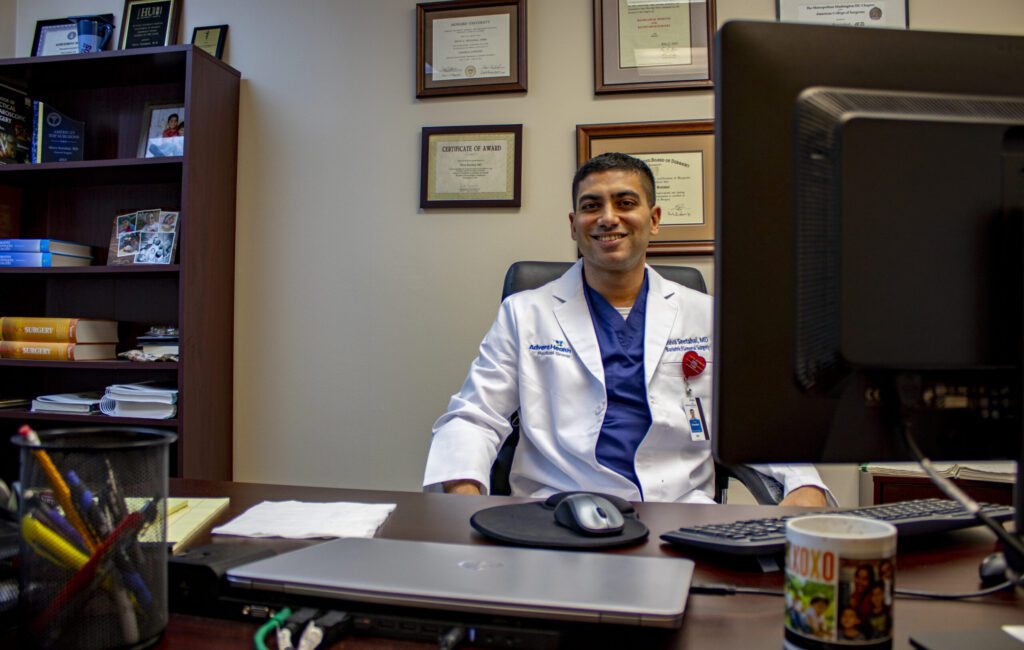Doctor and Patient Explain Why Bariatric Surgery Is So Much More Than Weight Loss
by Matthew Norman
The new year often brings thoughts of weight loss. It seems that there are endless numbers of weight loss methods. Everything from the tried and true methods to schemes that seem too good to be true, and probably are. For a growing number of people, the solution to their struggles is bariatric surgery.
What is bariatric surgery?
Commonly known as weight loss surgery, this is surgery intended to result in weight loss. A variety of options exist, all aimed at decreasing the amount of food that a person is able to eat, resulting in weight loss. The type and method of surgery depends on the patient, his or her goals, and the advice of the surgeon.
Why bariatric surgery?
Dr. Shiva Seetahal is a local surgeon specializing in bariatric surgery at AdventHealth Heart of Florida. When asked why he chose this specialty, he says he saw many people suffering from obesity. Aware of the health concerns this causes, he wanted to help.
Seetahal says many of his patients seek bariatric surgery after trying other weight loss methods with limited success. He goes on to say that, while some of them are looking to correct medical issues, most come in hopes of preventing them.
Teresa Coombs, 27, of Orlando, had bariatric surgery two years ago and lost 110 pounds. She says it was her decision to have the surgery was about weight, but also about much more. Her initial motivation was the hope of having a baby. She said she got tired of being told that she could not get pregnant unless she lost weight. One person even told her, “You’ll either have to get taller or lose weight.” At about 5 feet tall and in her mid-20s, she knew she was not likely to get any taller. So, she decided to lose weight.
What surprises came after the surgery?
While she’s very happy with the results, Coombs said wasn’t easy. Having never had any surgery, she was surprised by the amount of discomfort she had. She said she didn’t really have a lot of pain, but she was very uncomfortable. While this sort of discomfort is common with laparoscopic abdominal surgeries, it was new to Coombs.
The other big surprise was that she didn’t want to eat. She had struggled with her weight for years, and thought that after the surgery she would still be hungry and want to eat. Instead, she had to force herself to eat. She said that even looking at or thinking about food in the early weeks would make her nauseous. As a nurse, she knew she needed to eat in order to give her body the energy it needed to heal, so she forced herself. As the weeks passed she found that it became easier to eat and she began to enjoy eating again. Still, it was not the same. Her family was very supportive and often ate meals that they knew she could take part in, but she said she often cried as she could not enjoy much of the food that she used to, or that the people around her were eating.
Coombs likens her experience to that of an infant learning how to eat. She said her brain still thought she could eat the way she did before, but her new stomach simply couldn’t handle many of the same foods. For this reason, she had to start with very soft foods like apple sauce. Over time she moved on to more solid foods, but to this day finds there are foods she still can’t eat. Coombs admits the early days and weeks after her surgery were not easy.
Seetahal warns that while many think of this as a quick fix or even “cheating,” “bariatric surgery is simply one part of a complete lifestyle change that has to happen in order to experience long-term, sustained weight loss.” The surgery certainly helps, but it still requires making good food choices and finding ways to be more active. It’s hard work.
Was it worth it?
When asked if it was worth it, Coombs answers with an enthusiastic YES! While she is careful not to downplay the early difficulties, she has no trouble saying she’s glad she did it. She said her attitude changed the first time someone who had known her before the surgery did a double-take and said, “Wow, you look happy.” As she tried on clothes that she could have only dreamed of fitting in before she had a moment when she realized just how much her weight had affected her emotionally. She never thought it did but in that moment, as she looked back, she realized it had really held her down.
Seetahal says the vast majority of his patients would agree with Coombs. He says, for him, it’s the most rewarding surgery he does. His office staff often comment on how great it is to see patients come in looking not only healthier but also happier. His patients regularly report how the surgery has changed their lives. For many, it allows them to be more active and to do things that they would not have even considered doing before.
What difference did it make?
For Coombs, weight loss and buying smaller clothes was a big deal, but there was much more. While she was fairly healthy, the weight loss eliminated some health problems that she did have or that were threatening. These health benefits are obvious. But Coombs reports that it was so much more than that. “I’m so much more confident now. I was also shy before and I’m not now,” Coombs said. She now has a job traveling around the country training other oncology nurses. She says she would never have even applied for this job before. The surgery certainly changed her body, but that’s not all that changed.
